Friday, February 21, 2003
We caught the 6:00 a.m. bus for the one-hour ride
to Tikal. The first bus leaves at 5:00 a.m., but we
are not those people. Hopefully the hippies won't
have sucked out all the "energy" before we get
there.
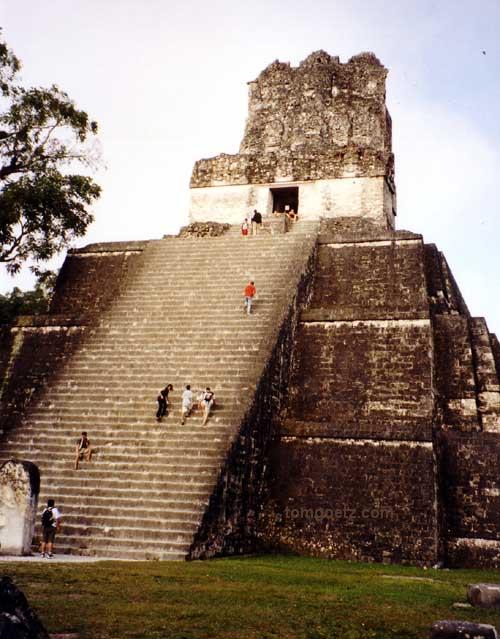
Templo II
Finally, Tikal! I've been waiting for this for
years! The massive ruins of Tikal are among the
largest in the Maya world, covering some ten square
miles and encompasssing thousands of individual
constructions, including temples, sacrificial altars,
residences, shrines, and more. More than 4,000
structures have been mapped so far, and excavation is
continuously underway. It is believed that thousands
of structures still lie below the shallow
topsoil.
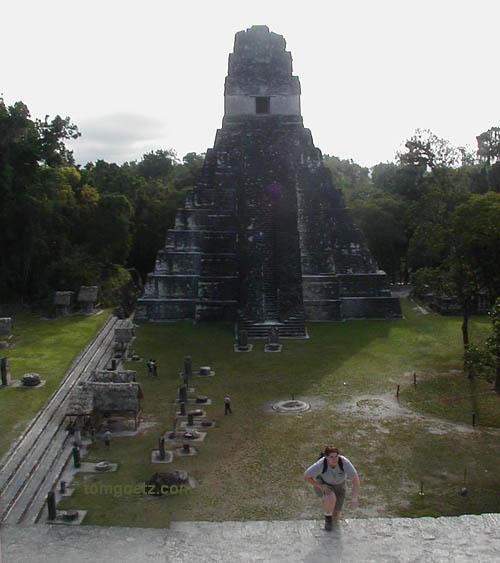
Templo I from Templo II
Tikal is believed to have been founded around 700
B.C., and at its height, around 650 to 750 A.D., was
home to roughly 70,000 residents. It is unknown why
the city suddenly became depopulated around the end
of the eighth century, after perhaps 1,500 years of
continuous occupation. Drought? Disease? Warfare? We
may never know. Eventually, the site was swallowed by
the forest, forgotten by all but a handful of local
Maya. Tikal first became known to the non-Maya world
in 1848, and scientific exloration began here in
1881. Tikal was the first fully protected
archeological preserve in Central America.
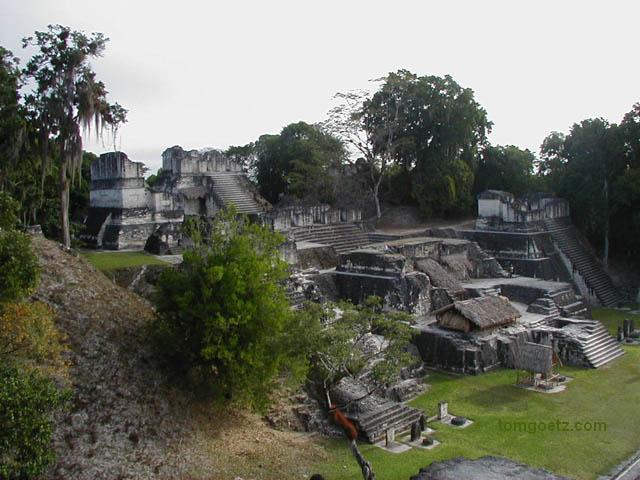
Acrópolis Norte
The ruins are situated on a low ridge at the
center of Tikal National Park and are surrounded by
forest that has not been significantly tampered with
since the city collapsed around 850 A.D. As well as
the structures, Tikal contains exotic plants and
wildlife. Hunting has been prohibited here since the
early 1930s, and many of the animals show little fear
of humans. We spotted spider monkeys, howler monkeys,
foxes, coatamundi (like a raccoon), guaqueque (a big,
weird tailless rat creature), bats, lizards, and lots
of hawks and other birds, many quite colorful. We
even saw another crocodile! I was looking for
dinosaurs - I'm sure there have to be some here - but
we didn't spot any.
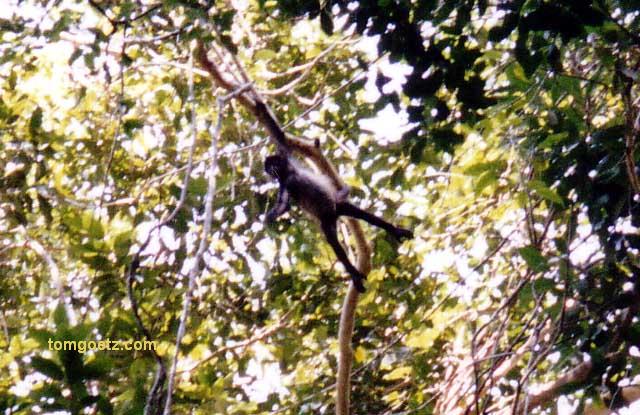
Spider Monkey!
Tikal is utterly amazing. Tikal's Maya name means
"the place where spirit voices are heard," which
seems very fitting. The morning was very damp and the
ruins shrouded in mist before burning off into a
bright, stunning day.
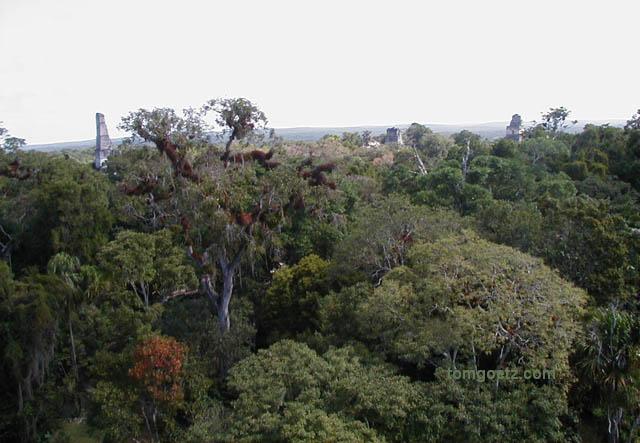
Templos III, II, and I above the jungle
canopy
Though not the tallest building at the site, we
found the best views from the top of what we believe
from our poor maps to be the ingloriously named
Structure 5C-54. This pyramid, located in El Mundo
Perdido (The Lost World), affords 360-degree views of
the ruins and the jungle canopy. We stayed up there
as long as we could, until the scorching sun forced
us down into the protective shade of the jungle.
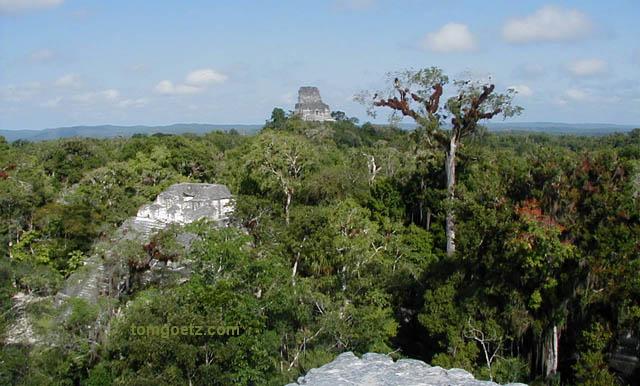
Palacio de las Ventanas and Templo IV
The highest structure in Tikal is the 212-foot
Temple IV, or Temple of the Double-Headed Serpent.
This was the highest known structure in the Western
Hemisphere until the first skyscrapers went up in
Manhattan in the 19th century. How did they build
these things? The view from the top of Temple IV
overlooks an uninterrupted sea of green forest.
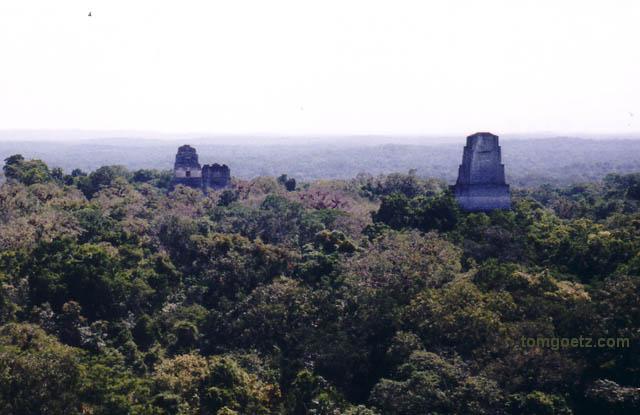
View from Templo IV
We've seen a few U.N. vehicles since we've been in
Guatemala. I wonder what they're sticking their noses
in this time.
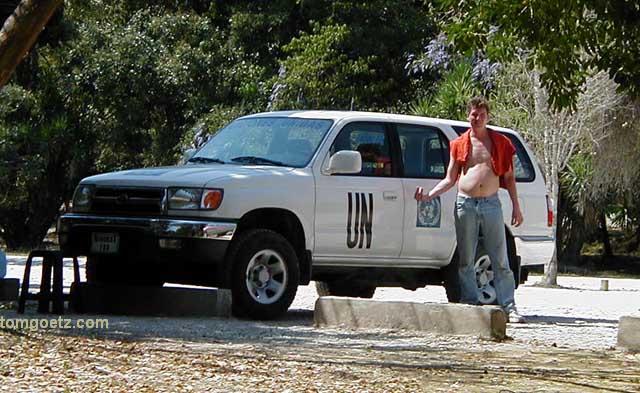
Tom salutes
We caught a 2:30 bus back to Flores, where we
rehydrated, ate, emailed, and reveled in the day's
experience. We have another early day tomorrow.
|







